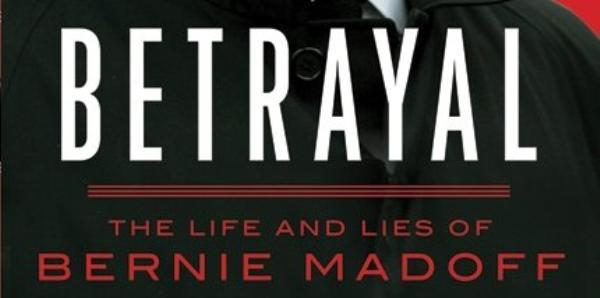The photograph of mega-Ponzi master Bernie Madoff on the dust cover of this book makes him look like a slightly subdued Fr Christmas. Madoff seems indeed to have enjoyed providing for people, especially his own family, who lived off his illegal financial dealings for decades, some in innocence, apparently. His sons, one of whom committed suicide after the meltdown of Madoff’s extraordinary enterprise, both worked for him in the legitimate arm of his financial empire. Andrew Kirtzman’s biography looks at the man behind the scheme and at those who were victims both of Madoff’s ruse and their own greed.
Most Ponzi or pyramid schemes are smaller and shorter-term than Madoff’s. The schemer persuades someone to invest, say one thousand dollars, in a venture which he says will earn 20% interest. Sure enough, the two hundred dollars roll in at the end of the year: the schemer has simply paid it out of the original thousand. He now persuades the investor to put in another thousand and to tell his friends about the investment. He might even offer a commission for each new investor. The schemer may in fact invest the money, but there’s no way in the world that he can make 20% consistently and so in order to keep paying out his clients (and earn himself a ‘living’) he has to expand his clientele continuously, always widening the financial base of the pyramid.
Eventually the base crumbles. This normally happens when some investors smell a rat and withdraw all their funds and everyone who can, follows suit. At this point the schemer may make a run for it, pocketing all his remaining investors’ money. This is precisely what one South African businessman is alleged to have done with some ninety million of his investors’ Rands. He fled and is currently fighting extradition from Australia.
The two questions that Kirtzman’s book attempts to answer are how Madoff got away with it for decades, becoming a revered, almost god-like figure on Wall Street; and what the motivation was that drove him to behave in this extraordinarily manipulative but risky manner.
Madoff seems to have got away with it through a combination of luck and chutzpah. A number of investigations were mounted into his business operations but these were done by young and inexperienced people who were dazzled by the man and the veneer of his legitimate financial operation’s fancy offices. He told them he had a secret but effective ‘split-strike’ investment system which yielded consistently high dividends in both good and bad times. Some simple cross-checks could have been done to verify the truth of the claim but weren’t. No one listened to or understood the mathematic modellers who realised that what Madoff claimed to be doing was a mathematical impossibility. Unfortunately one of these eggheads came across as a conspiracy theorist and was not taken seriously by the regulators. Madoff was also fortunate to have operated at a time when regulation was loose and freewheeling investment capitalism was regarded by many as a virtue.
As a member of the US Jewish community, Madoff had a ready-made network through which to expand constantly the amount of money pumping into his pyramid. Many charitable Jewish organisations entrusted their funds to his criminal care. But he cast his net ever wider, as the nature of his fraud necessitated. In the end he was handling billions of dollars and had made such a name for himself that he had an immensely wide spectrum of investors, from European banks to famous Hollywood figures such as Stephen Spielberg.
Why did he do it? At his trial he claimed that when he started out he believed that it was a temporary activity and that one day he would work his way out of it but that ‘it became impossible’. He apologised to the people whose lives he had ruined but he was sentenced to 150 years in prison at the age of 70. Kirtzman believes that the deeper reason for the reckless behaviour of Bernie Madoff was a deep sense of inferiority due to his limited intellect for which he compensated by making money and thus earning the respect of his ambitious, upwardly-mobile Jewish world. It’s a plausible thesis. As a young man he seems to have realised that he wasn’t going to become a doctor or an academic, as some of his peers were, but he started working and earning money while they were at their books. He also seems to have had an appetite for risk and there were some bad examples around in the family background: his parents had at one time run an illegal investment scheme. But there’s an obvious difficulty trying to fathom the murky motivations of a man who spent his entire adult life dissimulating and concealing the truth obsessively, even from his most intimate family members and friends.
The Madoff story is a contemporary morality tale but its lesson is as old as human greed and stupidity. It reminds us that there really is one born every minute and that we might even be among them if the promised rewards are tempting enough and the money-making system is presented plausibly. Some of those who had been gulled and pauperised testified against Madoff at his trial. The circumstances to which many of them were reduced were truly pathetic – hence their vindictive insistence that Madoff be put away for good. One witness cited Dante’s placing the perpetrators of fraud in the depths of Hell. During Madoff’s house arrest one angry man held up a placard outside which read, ‘Bernie, there’s still time to do the right thing; jump!’ It’s easy to understand the sense of violation that these traumatised people experienced. How his close family felt when he finally came clean to them is difficult to imagine. The word ‘Betrayal’ doesn’t quite carry enough force.
The author prepares the groundwork cleverly for the awful final dénouement of this real-life drama by describing meticulously the relationships that Madoff built up over 50 years, especially among the Palm Beach Jewish community in Florida. He established a kind of financial family in which he was the trusted patriarch. This description enhances the dramatic effect since the reader knows how false all this schmoozing is and that it’s all going to end in an unspeakable nightmare for these people. Many are gullible and greedy and one’s feelings are often divided between sheer pity and schadenfreude. There’s also a temptation to voyeurism inherent in an account of a human tragedy of this nature. It’s somewhat like being inclined to slow down and take a good look at a car crash, and one that you’ve been informed about before you arrive. One feels the frisson of the accident site and also a sense of gratitude at not being among the dead or injured.
So it’s a dramatic page-turner but also a sad and sobering book. It’s also a book that reminds the reader of the foibles of others but that ‘there but for the grace of God go I’. And it stands as a personalised indictment to the greed of an era in which people who should have known better deliberately created financial bubbles and developed the market as a kind of casino. Madoff was its supremely crooked croupier.
The reviewer, Chris Chatteris SJ, is currently teaching at St Francis Xavier Orientation Seminary in Cape Town.






